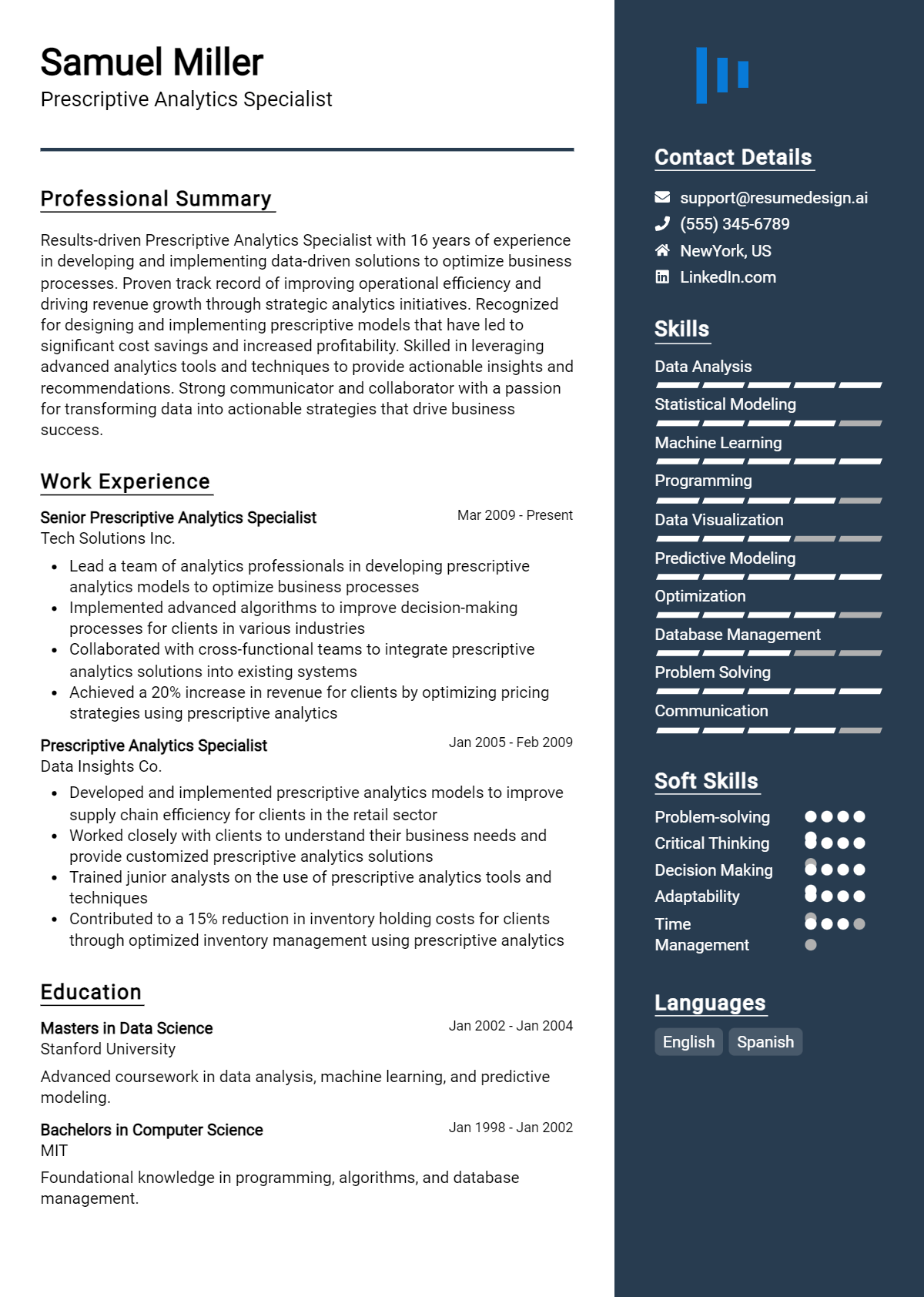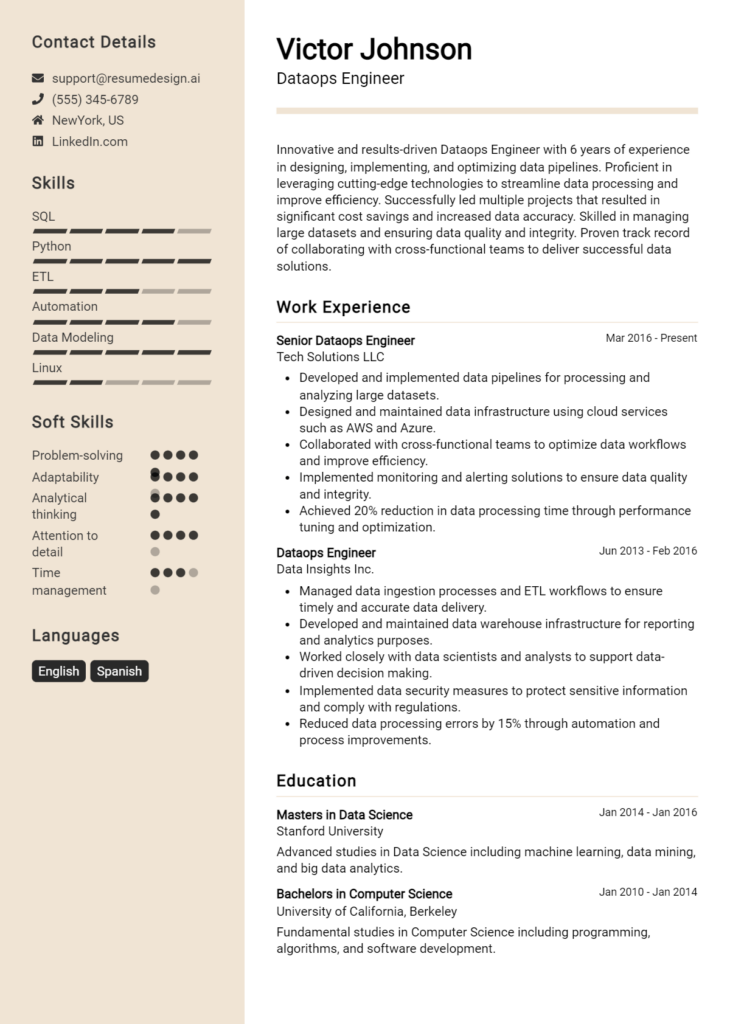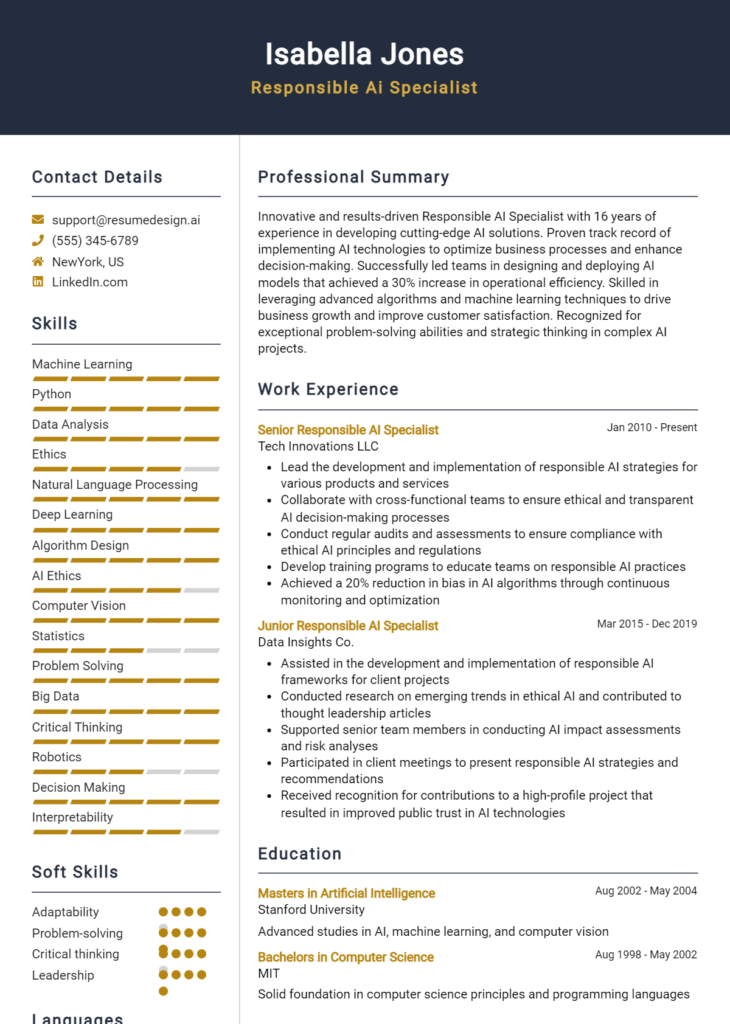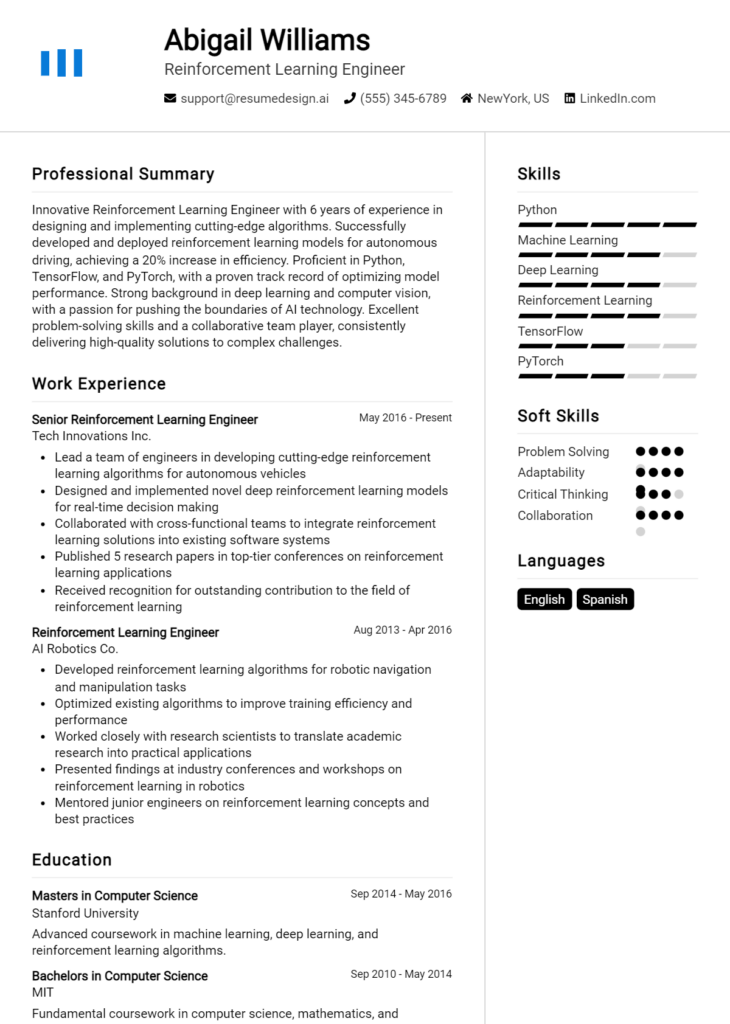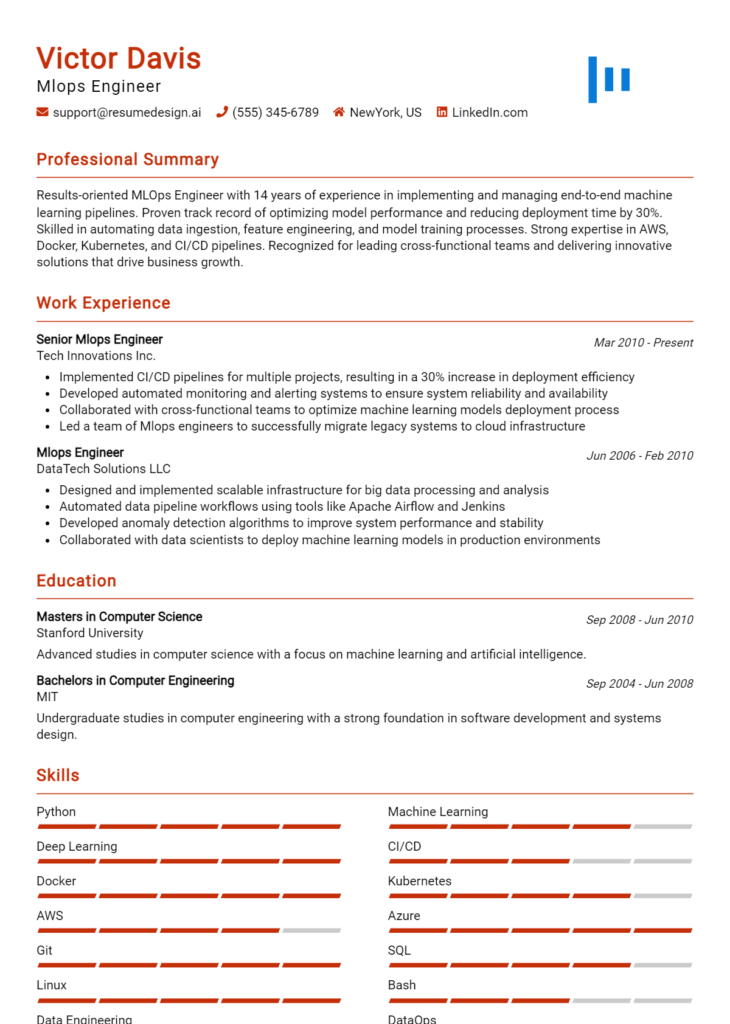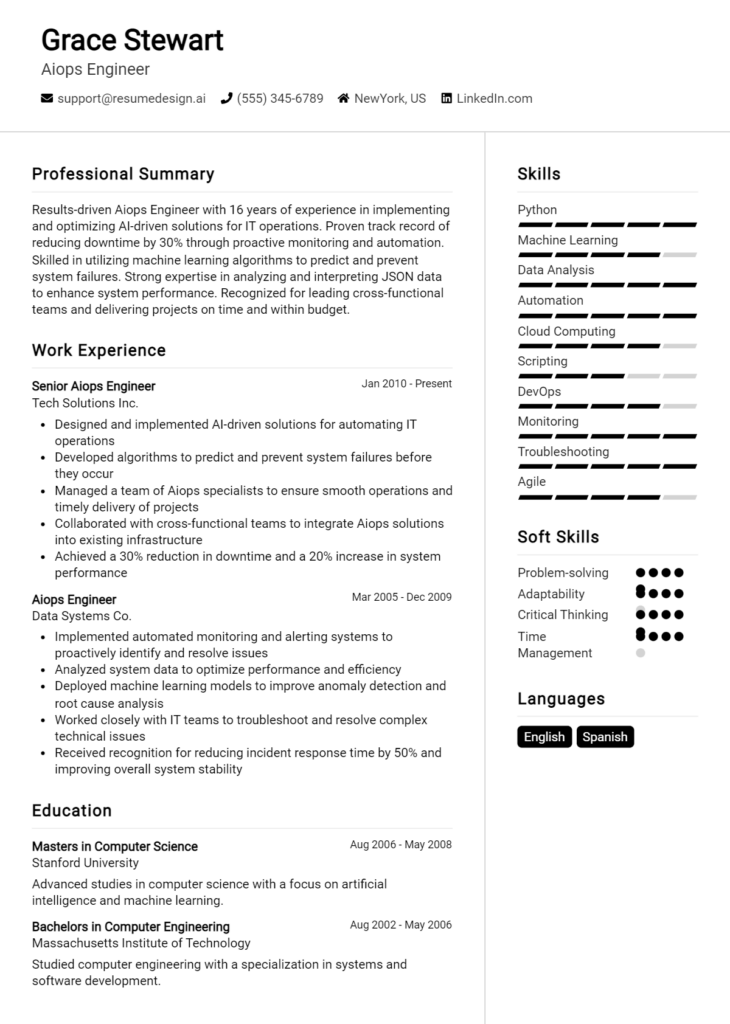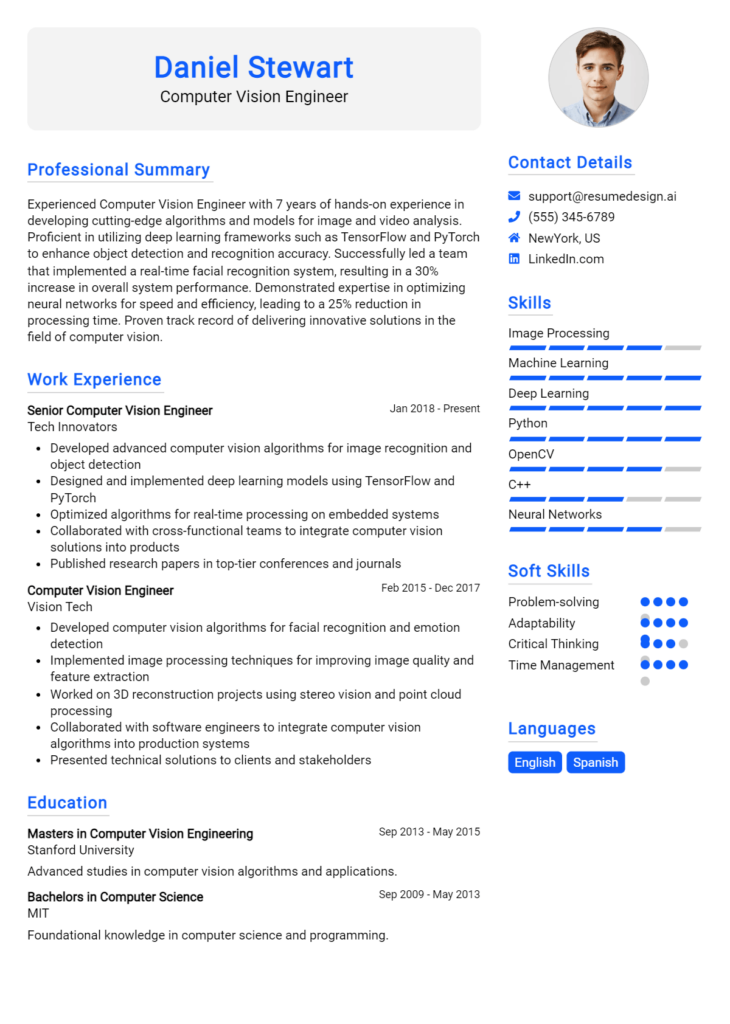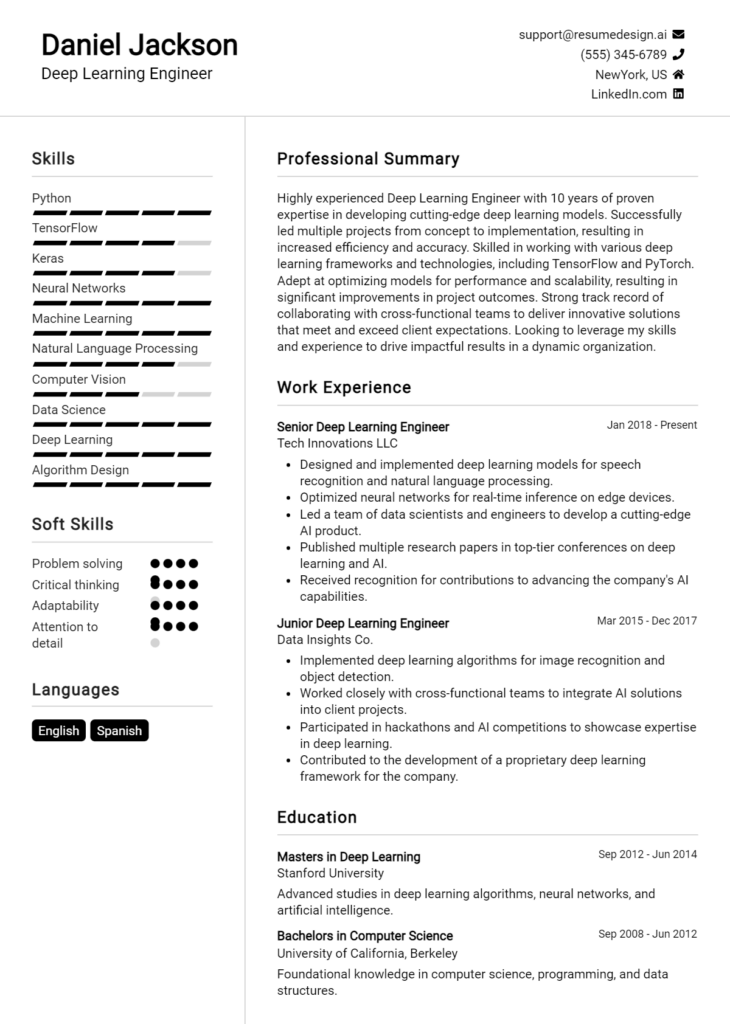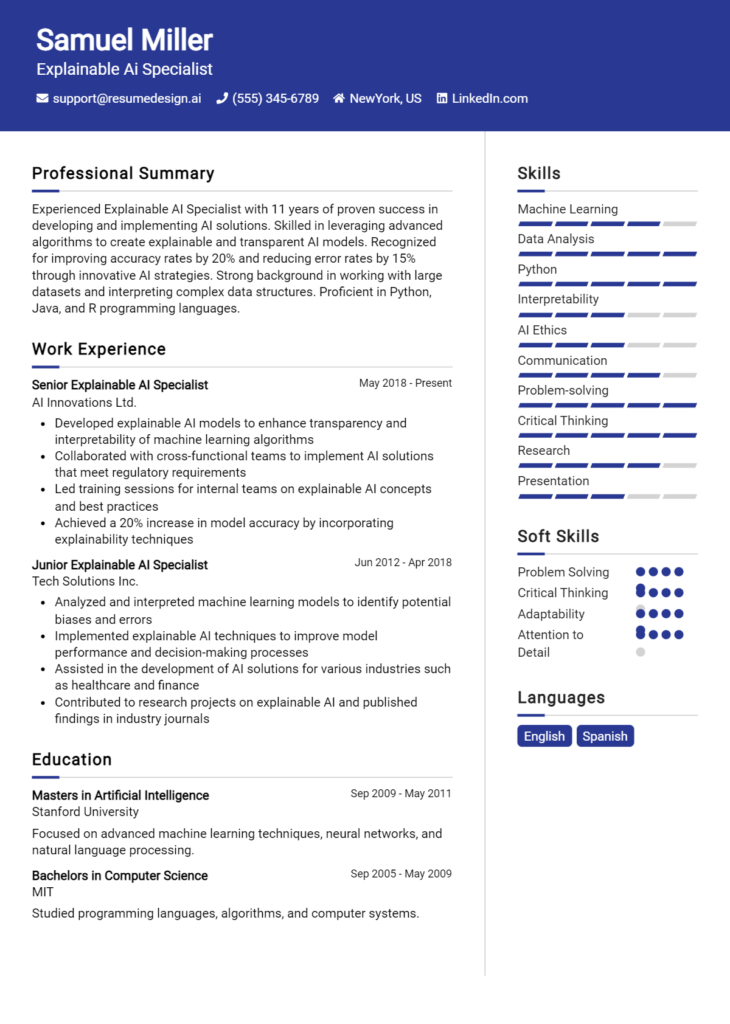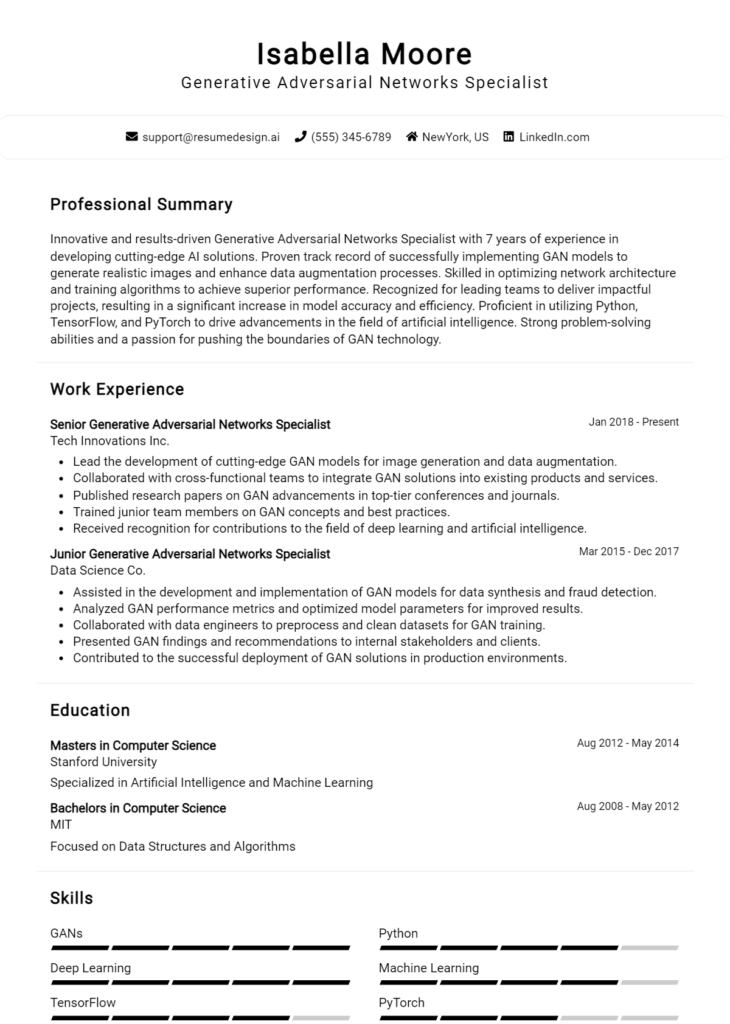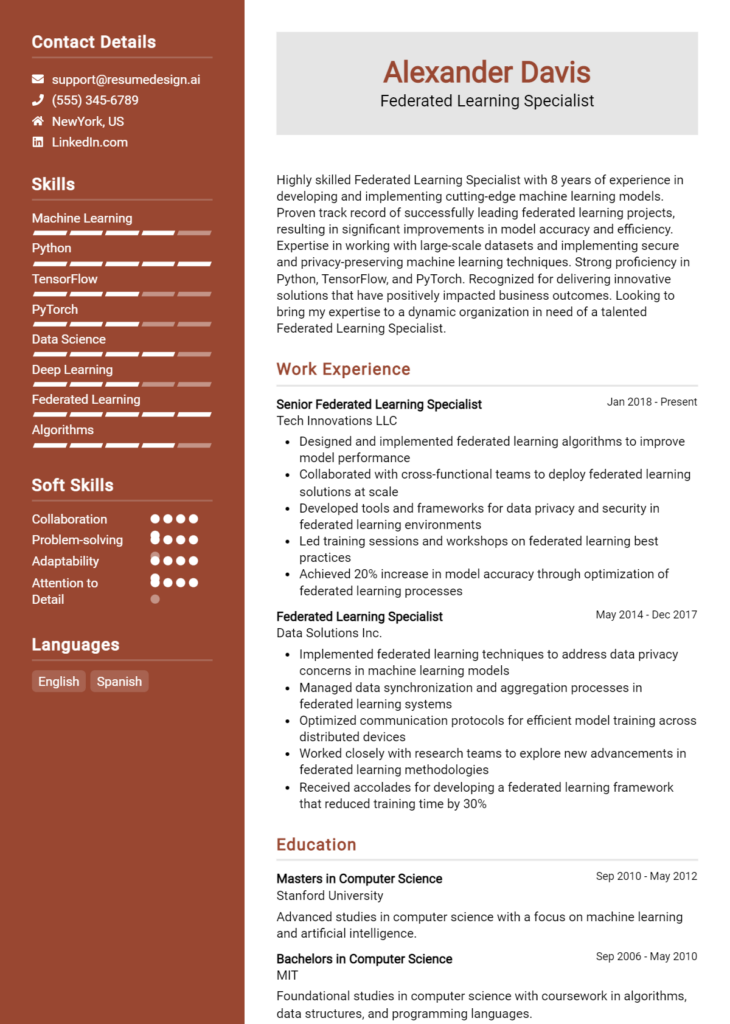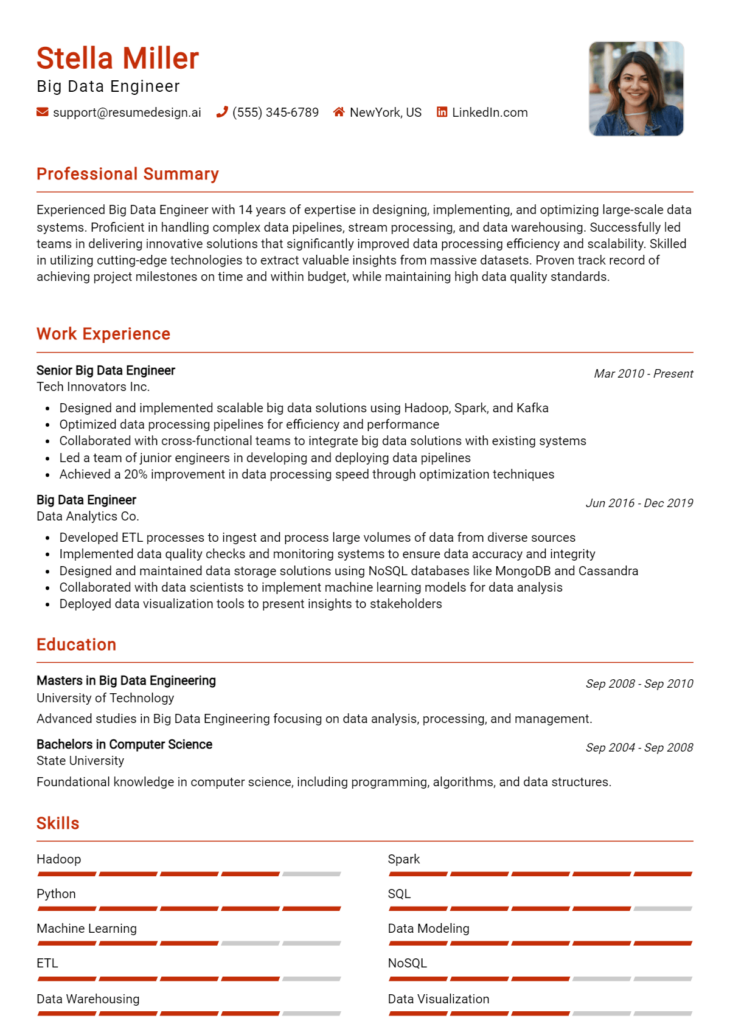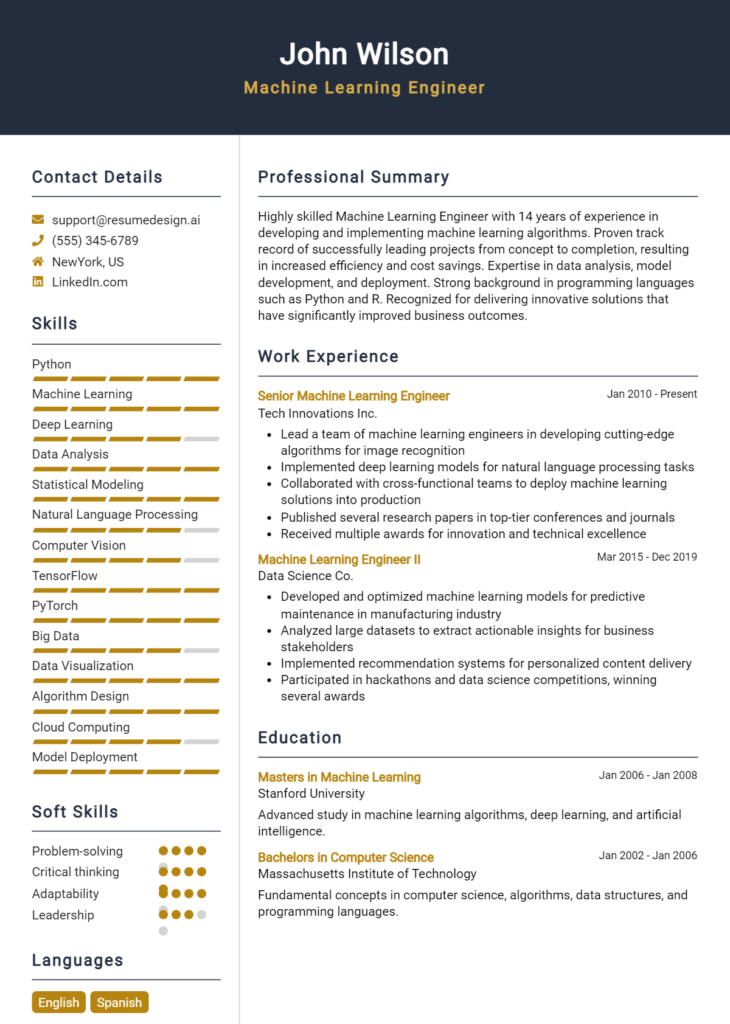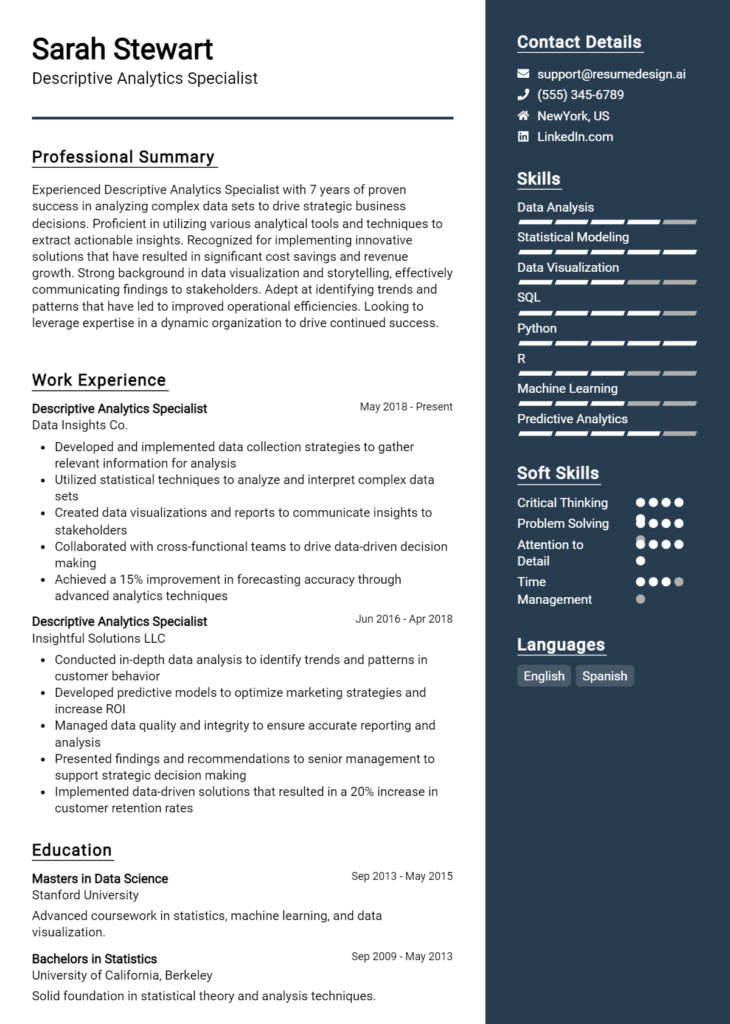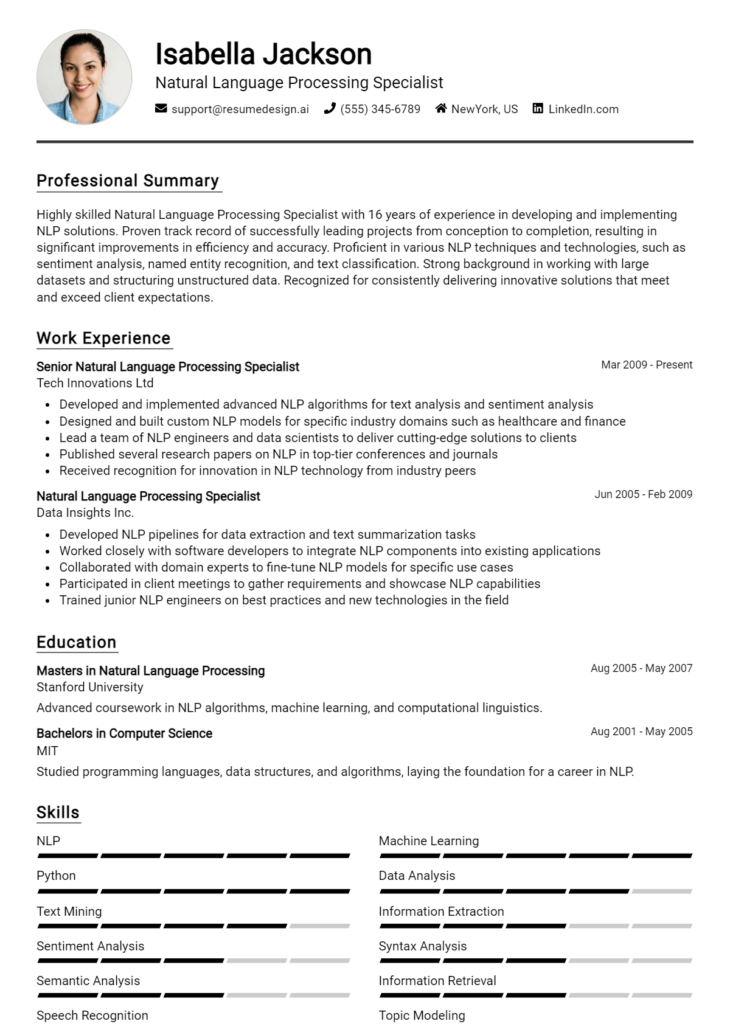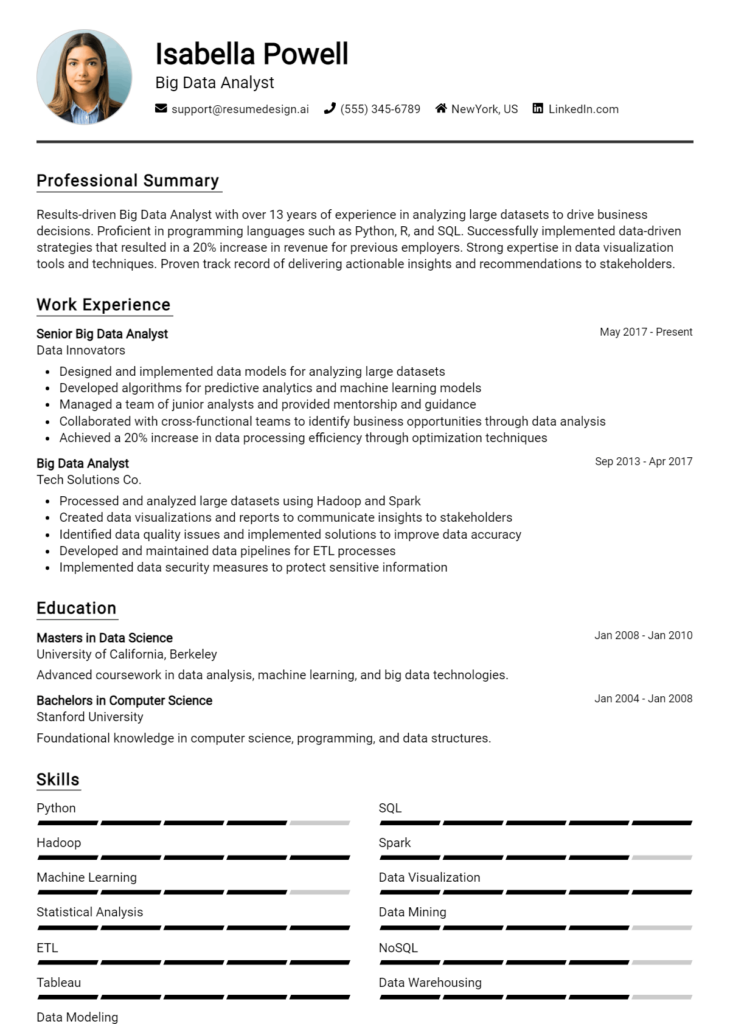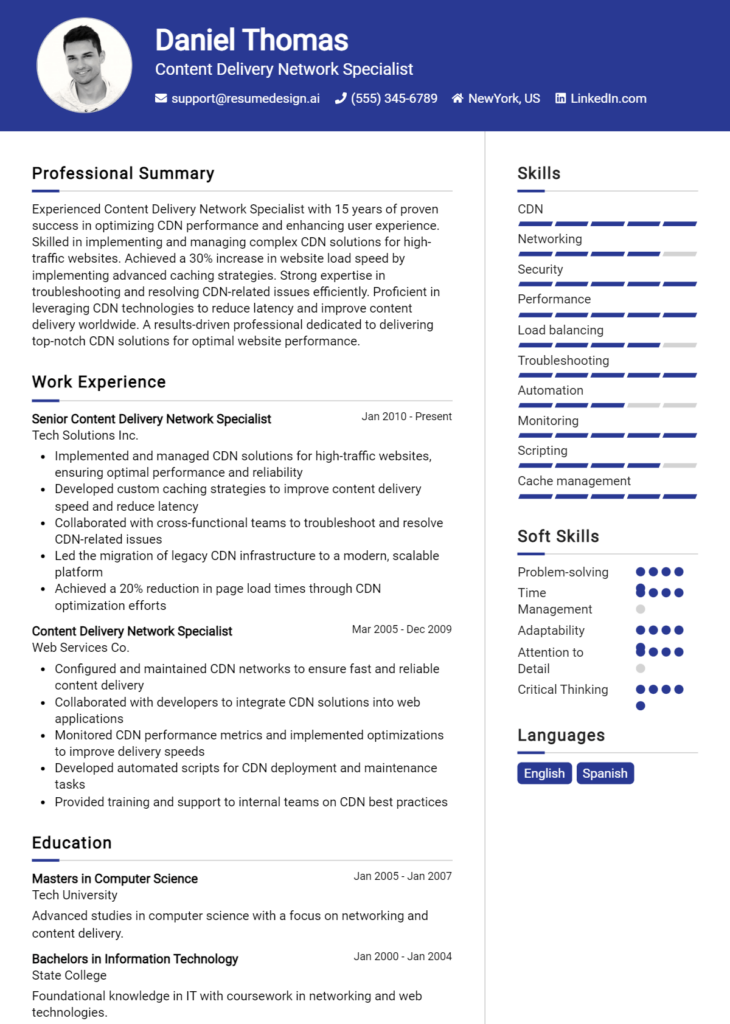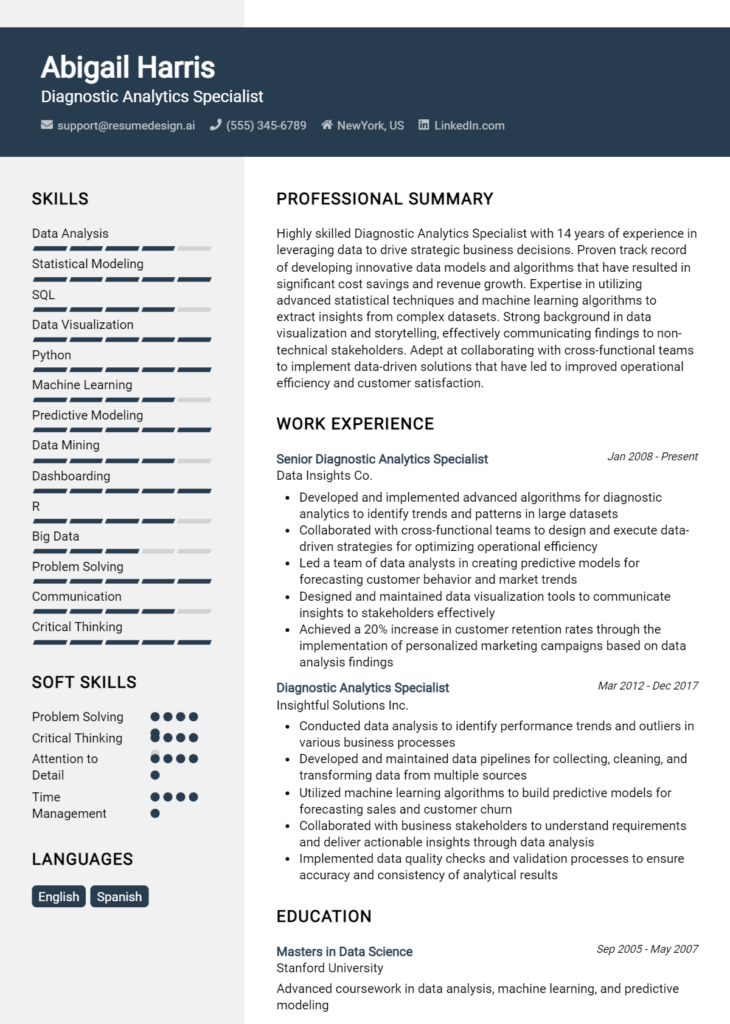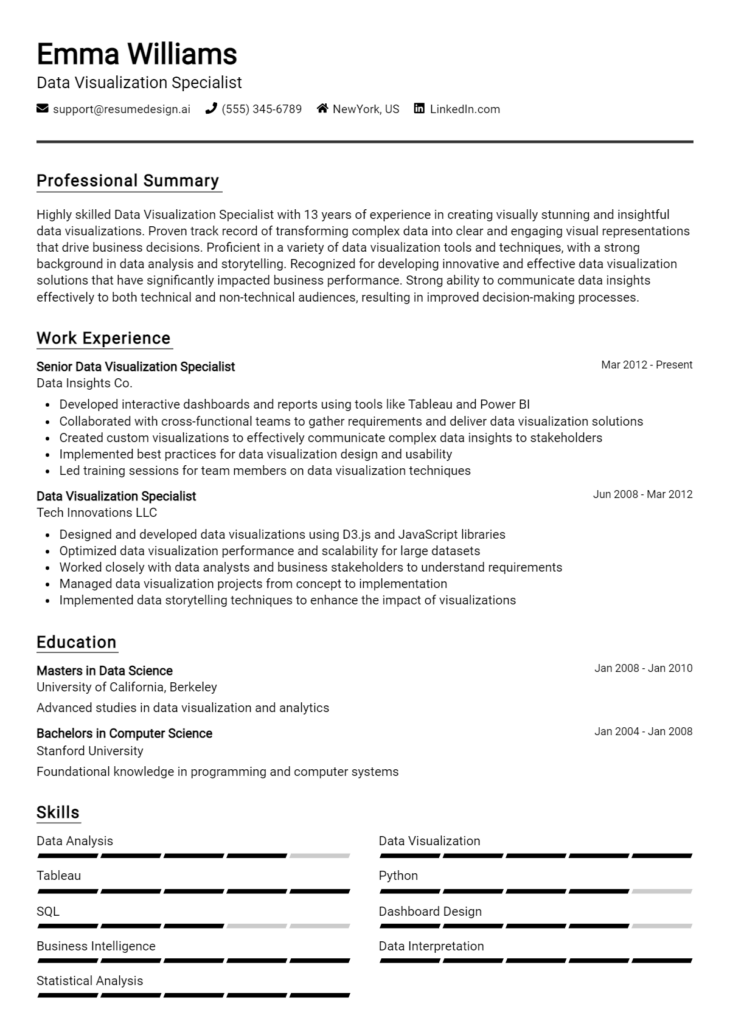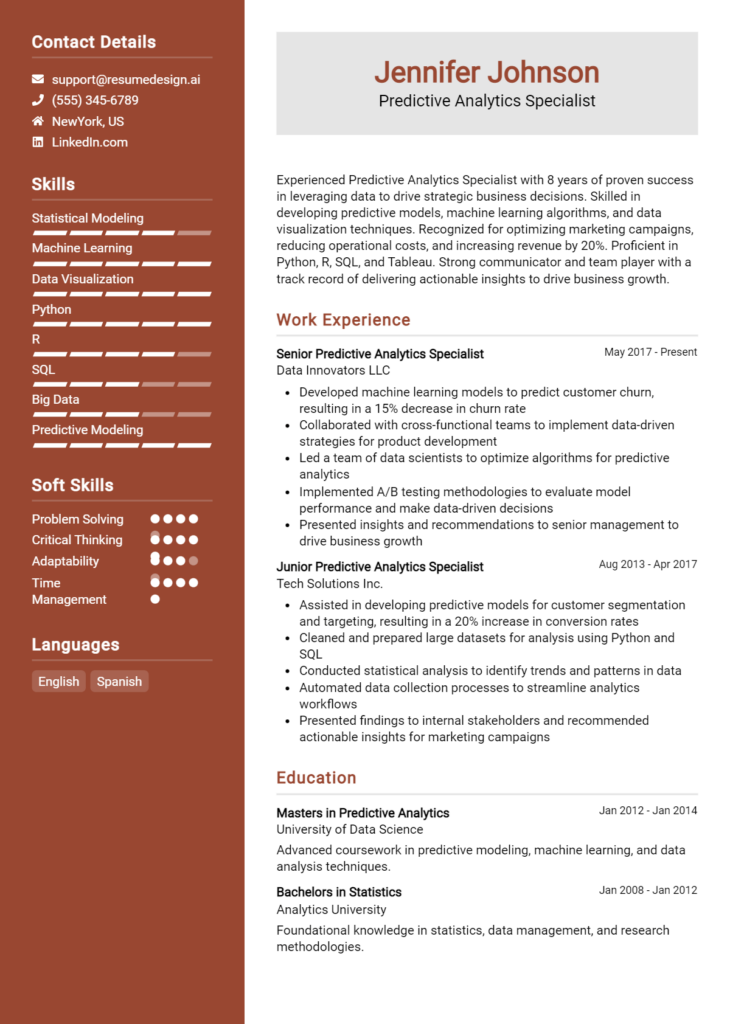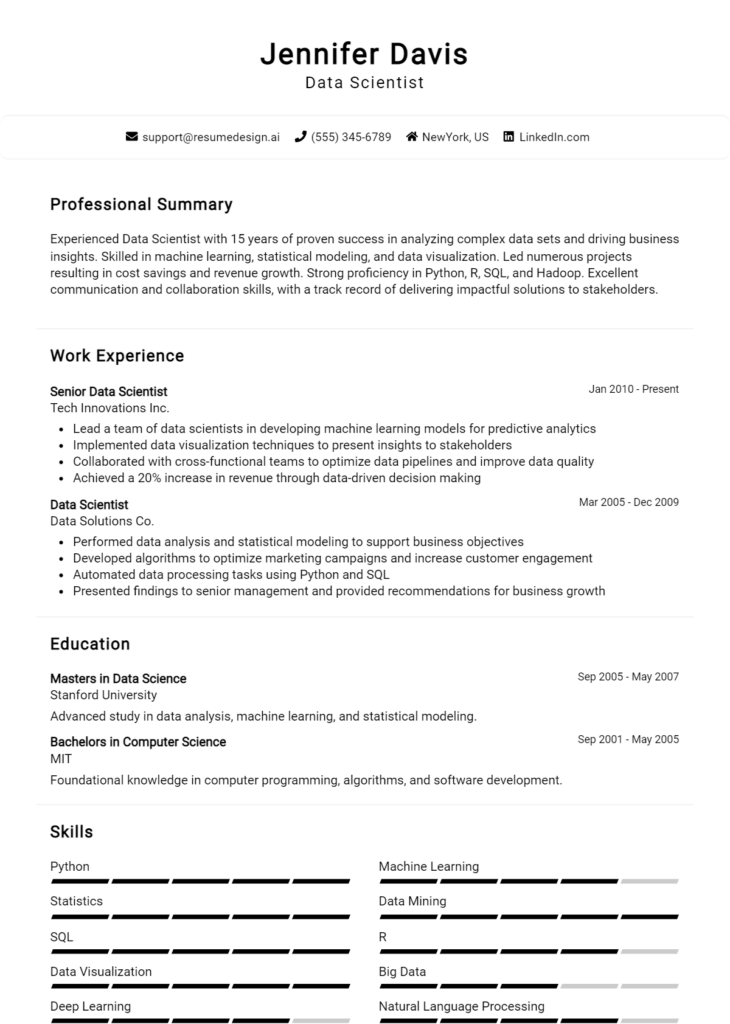Prescriptive Analytics Specialist Core Responsibilities
A Prescriptive Analytics Specialist plays a vital role in leveraging data to inform decision-making across various departments within an organization. Key responsibilities include analyzing complex datasets, developing optimization models, and recommending actionable strategies to enhance operational efficiency. Essential skills encompass technical expertise in analytics tools, strong problem-solving abilities, and effective communication to bridge gaps between departments. By aligning insights with organizational goals, these specialists drive performance and innovation, making a well-structured resume crucial to showcase their qualifications and experience.
Common Responsibilities Listed on Prescriptive Analytics Specialist Resume
- Develop and implement prescriptive analytics models to optimize business processes.
- Collaborate with cross-functional teams to understand data requirements and insights.
- Analyze data trends and provide actionable recommendations to stakeholders.
- Utilize advanced analytics tools and software for data visualization.
- Conduct scenario analysis to evaluate potential outcomes and strategies.
- Monitor performance metrics to assess the effectiveness of implemented solutions.
- Present findings and strategies to senior management clearly and effectively.
- Stay updated on industry trends and best practices in analytics.
- Document methodologies and processes for future reference and training.
- Support data governance initiatives to ensure data integrity and quality.
- Assist in training team members on prescriptive analytics techniques.
- Participate in strategic planning sessions to align analytics initiatives with business goals.
High-Level Resume Tips for Prescriptive Analytics Specialist Professionals
A well-crafted resume is essential for Prescriptive Analytics Specialist professionals, as it often serves as the first impression a candidate makes on a potential employer. In a competitive job market, your resume must effectively showcase your skills, achievements, and unique qualifications that set you apart from other candidates. A strong resume not only highlights your technical expertise in analytics but also demonstrates your ability to leverage data to drive strategic decisions. This guide will provide practical and actionable resume tips specifically tailored for Prescriptive Analytics Specialist professionals, ensuring you present yourself as a top candidate in your field.
Top Resume Tips for Prescriptive Analytics Specialist Professionals
- Tailor your resume to the job description by including relevant keywords and phrases that match the requirements of the position.
- Showcase your experience with specific prescriptive analytics tools and software, such as optimization techniques, machine learning algorithms, and simulation models.
- Quantify your achievements by including metrics and data that highlight your contributions, like cost savings, increased efficiency, or improved decision-making outcomes.
- Highlight your problem-solving skills by detailing specific projects where you successfully addressed complex business challenges through analytics.
- Include a dedicated skills section that emphasizes both technical skills (e.g., programming languages, data visualization tools) and soft skills (e.g., communication, teamwork).
- Utilize a clean, professional format that enhances readability and draws attention to key sections of your resume.
- Incorporate relevant certifications or coursework that demonstrate your expertise in analytics and commitment to professional development.
- Provide context for your role in team projects, emphasizing collaboration and leadership, to showcase your ability to work effectively in a team environment.
- Keep your resume concise, ideally one page, while ensuring all critical information about your background is included.
By implementing these tips, you can significantly increase your chances of landing a job in the Prescriptive Analytics Specialist field. A well-structured resume that effectively highlights your skills and accomplishments will not only catch the attention of hiring managers but also position you as a strong contender for roles that require analytical prowess and strategic thinking.
Why Resume Headlines & Titles are Important for Prescriptive Analytics Specialist
In the competitive landscape of job applications, a well-crafted resume headline or title plays a crucial role for a Prescriptive Analytics Specialist. It serves as the candidate's first impression, offering hiring managers an immediate glimpse into their qualifications and expertise. A strong headline can succinctly encapsulate a candidate's key strengths, such as their analytical skills, experience with data-driven decision-making, or proven results in optimizing business processes. By being concise, relevant, and directly aligned with the job description, a compelling headline can effectively capture attention and encourage further exploration of the resume.
Best Practices for Crafting Resume Headlines for Prescriptive Analytics Specialist
- Keep it concise: Aim for a headline that is brief yet informative.
- Be role-specific: Tailor the headline to reflect the specific position of Prescriptive Analytics Specialist.
- Highlight key skills: Incorporate essential skills or technologies relevant to the role.
- Showcase experience: Mention years of experience or notable achievements in analytics.
- Use impactful language: Choose powerful words that convey confidence and expertise.
- Avoid jargon: Ensure clarity by steering clear of overly technical language that may confuse readers.
- Align with job description: Reflect keywords from the job posting to demonstrate relevance.
- Make it unique: Stand out by avoiding clichés and generic phrases.
Example Resume Headlines for Prescriptive Analytics Specialist
Strong Resume Headlines
Data-Driven Prescriptive Analytics Specialist with 5+ Years of Experience in Optimizing Business Strategies
Results-Oriented Analytics Expert Specializing in Predictive Modeling and Strategic Decision Support
Transformative Prescriptive Analyst with Proven Success in Enhancing Operational Efficiency through Data Insights
Weak Resume Headlines
Analytics Specialist
Experienced Data Professional
The strong headlines are effective because they are specific, highlight essential skills, and convey the candidate's value proposition in a compelling manner. They immediately communicate the individual's qualifications and align closely with the expectations for a Prescriptive Analytics Specialist. Conversely, the weak headlines lack specificity and fail to capture the candidate's unique strengths or relevance to the role, which diminishes their impact and leaves hiring managers unimpressed.
Writing an Exceptional Prescriptive Analytics Specialist Resume Summary
A resume summary is a crucial element for a Prescriptive Analytics Specialist, as it serves as the first point of contact between the candidate and potential employers. A strong summary quickly captures the attention of hiring managers by succinctly highlighting key skills, relevant experience, and significant accomplishments that align with the job role. By distilling essential information into a concise and impactful statement, candidates can effectively communicate their value proposition, making it easier for hiring managers to assess their fit for the position. Tailoring the summary to the specific job application enhances its effectiveness, ensuring that the candidate stands out in a competitive job market.
Best Practices for Writing a Prescriptive Analytics Specialist Resume Summary
- Quantify achievements by including specific metrics and results to demonstrate impact.
- Focus on key skills that are directly relevant to prescriptive analytics, such as data modeling, optimization techniques, and statistical analysis.
- Tailor the summary to match the job description, using keywords that resonate with the employer's requirements.
- Keep it concise, aiming for 3-5 sentences that deliver maximum impact.
- Highlight relevant experience, particularly in implementing prescriptive models and decision-making frameworks.
- Showcase soft skills, such as communication and teamwork, which are essential for collaborating with stakeholders.
- Avoid jargon and overly technical language that may alienate non-technical hiring managers.
- Use a confident tone that reflects your expertise and readiness to contribute to the organization.
Example Prescriptive Analytics Specialist Resume Summaries
Strong Resume Summaries
Results-driven Prescriptive Analytics Specialist with over 5 years of experience optimizing supply chain operations, achieving a 20% reduction in costs through advanced predictive modeling and data-driven decision-making.
Dedicated analytics professional skilled in applying statistical techniques and machine learning algorithms to enhance business processes, resulting in a 30% increase in operational efficiency for clients in the retail sector.
Proficient in developing prescriptive analytics frameworks that support strategic decision-making; successfully led a project that improved marketing campaign ROI by 15% through data-driven insights and optimization strategies.
Weak Resume Summaries
Experienced analytics specialist looking for opportunities in prescriptive analytics.
Skilled in data analysis and problem-solving, with a focus on improving business outcomes.
The strong resume summaries are considered effective because they provide specific details about the candidate's achievements, incorporate quantifiable outcomes, and highlight relevant skills that align closely with the expectations of a Prescriptive Analytics Specialist. In contrast, the weak summaries lack specificity and measurable results, making them appear generic and unmemorable, which diminishes their impact in a competitive job market.
Work Experience Section for Prescriptive Analytics Specialist Resume
The work experience section of a Prescriptive Analytics Specialist resume is vital as it showcases the candidate's technical skills and their ability to manage teams effectively while delivering high-quality products. This section serves as a narrative of the candidate's professional journey, illustrating how they have applied analytical techniques to solve complex business problems. Furthermore, quantifying achievements and aligning work experiences with industry standards are crucial to demonstrating not only proficiency in analytics but also a commitment to driving results that align with organizational goals.
Best Practices for Prescriptive Analytics Specialist Work Experience
- Highlight specific technical skills relevant to prescriptive analytics, such as optimization techniques, machine learning, and data visualization tools.
- Use quantifiable metrics to illustrate the impact of your work, such as percentage improvements in efficiency or revenue growth.
- Detail your role in team projects, emphasizing leadership and collaboration to showcase your ability to work well with others.
- Include industry-standard terminology to align your experience with what employers are seeking.
- Focus on outcomes rather than responsibilities by describing how your actions led to successful project completions.
- Tailor your experiences to the specific job description to ensure relevance and highlight your suitability for the role.
- Utilize action verbs to convey a sense of proactive engagement in your past roles.
- List relevant certifications or training that complement your work experience in prescriptive analytics.
Example Work Experiences for Prescriptive Analytics Specialist
Strong Experiences
- Led a cross-functional team to implement a prescriptive analytics solution that reduced operational costs by 20%, saving the company $500,000 annually.
- Developed and deployed an advanced forecasting model that improved sales predictions accuracy by 35%, resulting in a 15% increase in quarterly revenue.
- Collaborated with IT and business units to integrate machine learning algorithms into existing workflows, enhancing decision-making processes and reducing turnaround times by 30%.
Weak Experiences
- Worked on various analytics projects within the team.
- Assisted in data analysis and reporting tasks.
- Participated in meetings to discuss analytics strategies.
The examples provided illustrate a clear distinction between strong and weak experiences. Strong experiences demonstrate quantifiable outcomes, leadership in technical projects, and effective collaboration, showcasing the candidate's ability to drive significant results. In contrast, weak experiences are vague and lack specific achievements or contributions, failing to convey the candidate's impact or value in previous roles.
Education and Certifications Section for Prescriptive Analytics Specialist Resume
The education and certifications section of a Prescriptive Analytics Specialist resume is a critical component that underscores a candidate's academic foundation, relevant industry certifications, and commitment to continuous professional development. This section not only showcases the necessary educational credentials but also highlights specialized training and coursework that align with the demands of the role. By providing detailed information about relevant degrees, certifications, and ongoing learning efforts, candidates can significantly enhance their credibility and demonstrate their alignment with the requirements of prospective employers in the field of prescriptive analytics.
Best Practices for Prescriptive Analytics Specialist Education and Certifications
- Focus on degrees and certifications that are directly related to analytics, statistics, or data science.
- Include relevant coursework that demonstrates a strong foundation in prescriptive analytics methodologies.
- Highlight industry-recognized certifications such as Certified Analytics Professional (CAP) or similar credentials.
- Provide the full name of institutions and the dates of graduation or certification completion.
- Prioritize advanced degrees (Master’s or Ph.D.) that showcase a deeper understanding of analytics concepts.
- List any specialized training or workshops completed that are pertinent to prescriptive analytics tools and techniques.
- Keep descriptions concise but informative to maintain clarity and readability.
- Regularly update this section to reflect new certifications or educational achievements.
Example Education and Certifications for Prescriptive Analytics Specialist
Strong Examples
- M.S. in Data Science, University of California, Berkeley (2022)
- Certified Analytics Professional (CAP), INFORMS (2023)
- Advanced Predictive and Prescriptive Analytics Course, Coursera (2021)
- B.S. in Statistics, University of Michigan (2020)
Weak Examples
- High School Diploma, Springfield High School (2008)
- Basic Excel Certification, Online Learning Academy (2015)
- Certificate in Business Administration, Local Community College (2010)
- Introduction to Programming Course, Generic Online Platform (2019)
The strong examples listed above are considered effective because they demonstrate relevant educational qualifications and industry-recognized certifications that directly align with the role of a Prescriptive Analytics Specialist. These credentials indicate a solid foundation and expertise in analytics. Conversely, the weak examples lack relevance to the field of prescriptive analytics and do not reflect the advanced knowledge or skills necessary for this specialized role. They may be outdated or too basic, failing to impress potential employers seeking qualified candidates.
Top Skills & Keywords for Prescriptive Analytics Specialist Resume
In the rapidly evolving field of data analytics, a Prescriptive Analytics Specialist plays a crucial role in guiding organizations toward informed decision-making. Crafting a compelling resume that highlights relevant skills is essential for standing out in a competitive job market. This role requires a unique blend of analytical prowess and interpersonal abilities, making it vital to showcase both hard and soft skills effectively. Potential employers seek candidates who not only possess technical expertise but also demonstrate strong communication, problem-solving, and teamwork capabilities. By emphasizing the right skills, you can significantly enhance your resume and increase your chances of landing an interview in this dynamic field.
Top Hard & Soft Skills for Prescriptive Analytics Specialist
Soft Skills
- Effective Communication
- Critical Thinking
- Problem Solving
- Collaboration
- Adaptability
- Time Management
- Attention to Detail
- Creativity
- Interpersonal Skills
- Leadership
Hard Skills
- Statistical Analysis
- Data Mining
- Predictive Modeling
- Optimization Techniques
- Machine Learning
- Programming Languages (e.g., R, Python)
- Database Management (SQL)
- Data Visualization Tools (e.g., Tableau, Power BI)
- Business Intelligence Solutions
- Knowledge of Operations Research
Highlighting these skills on your resume can help demonstrate your qualifications as a Prescriptive Analytics Specialist. Additionally, don't forget to detail your relevant work experience to provide context and evidence of your capabilities in applying these skills effectively.
Stand Out with a Winning Prescriptive Analytics Specialist Cover Letter
Dear [Hiring Manager's Name],
I am writing to express my interest in the Prescriptive Analytics Specialist position at [Company Name], as advertised on [where you found the job listing]. With a robust background in data analytics, coupled with a Master’s degree in Data Science, I am excited about the opportunity to leverage my skills in predictive modeling and optimization techniques to drive data-driven decision-making within your organization. My experience in analyzing complex datasets and translating insights into actionable strategies aligns perfectly with the goals of your team.
In my previous role at [Previous Company Name], I was responsible for developing and implementing prescriptive analytics solutions that improved operational efficiency by 25%. By utilizing advanced statistical techniques and machine learning algorithms, I identified key variables affecting business performance and created models that provided strategic recommendations to enhance resource allocation. My ability to communicate complex analytical concepts to non-technical stakeholders ensured that the insights were not only actionable but also integrated seamlessly into the business processes.
I am particularly drawn to [Company Name] because of your commitment to innovation and the application of analytics in shaping business strategies. I am eager to bring my technical expertise in programming languages such as Python and R, along with my proficiency in tools like Tableau and SQL, to contribute to your mission. I am confident that my analytical mindset and problem-solving skills will allow me to make a significant impact on your analytics team and help drive data-informed decisions that align with your business objectives.
Thank you for considering my application. I look forward to the opportunity to discuss how my skills and experiences can contribute to the continued success of [Company Name]. I am excited about the chance to collaborate with your team and to further develop my career in prescriptive analytics.
Sincerely,
[Your Name]
[Your Phone Number]
[Your Email Address]
[LinkedIn Profile or Website, if applicable]
Common Mistakes to Avoid in a Prescriptive Analytics Specialist Resume
When crafting a resume for a Prescriptive Analytics Specialist position, candidates often overlook critical elements that can significantly impact their chances of landing an interview. A well-structured resume not only highlights relevant skills and experiences but also aligns with the expectations of hiring managers in the analytics field. Here are some common mistakes to avoid when creating your resume:
Generic Objective Statements: Using a one-size-fits-all objective can make your resume blend in with the crowd. Tailor your objective to reflect your specific interest in the role and how your skills meet the company’s needs.
Lack of Quantifiable Achievements: Failing to include numbers or specific outcomes can weaken your impact. Highlight your accomplishments with data-driven results, such as percentage improvements or revenue growth, to showcase your effectiveness.
Overloading with Technical Jargon: While it’s important to demonstrate technical skills, using too much industry jargon can alienate non-technical hiring managers. Balance technical terminology with clear explanations of your skills and experiences.
Ignoring Soft Skills: Prescriptive analytics is not just about technical proficiency; it also requires strong communication and collaboration skills. Failing to mention these can give an incomplete picture of your capabilities.
Neglecting Relevant Keywords: Many companies use Applicant Tracking Systems (ATS) to filter resumes. Not including relevant keywords from the job description can cause your resume to be overlooked. Carefully read the job listing and integrate those keywords into your resume.
Inconsistent Formatting: A cluttered or inconsistent format can distract from your qualifications. Ensure that your resume is easy to read with uniform font styles, sizes, and spacing to maintain a professional appearance.
Failing to Tailor Experience: Listing all past roles without emphasizing relevant experiences for the prescriptive analytics field can dilute your message. Focus on experiences that directly relate to the role and illustrate your expertise in analytics.
Leaving Out Continuing Education: In a rapidly evolving field like analytics, neglecting to mention ongoing training or certifications can suggest a lack of commitment to professional development. Include any relevant courses or certifications to demonstrate your proactive approach to staying current in the field.
Conclusion
As we conclude our exploration of the role of a Prescriptive Analytics Specialist, it's clear that this position plays a pivotal role in transforming data into actionable insights that drive strategic decision-making. This specialist not only analyzes past and present data but also predicts future outcomes, providing organizations with the ability to optimize operations and enhance profitability.
Key responsibilities include the development of models that guide business strategies, collaboration with cross-functional teams to implement data-driven solutions, and the continuous evaluation of analytics methodologies to improve effectiveness and accuracy. In an era where data is paramount, the importance of this role cannot be overstated.
We encourage you to take a moment to review your Prescriptive Analytics Specialist resume. Ensure that it effectively highlights your skills in data analysis, problem-solving, and your experience with predictive modeling. To assist you in this endeavor, we recommend exploring various resources available online. You can find resume templates to give your resume a professional touch, utilize the resume builder for a user-friendly experience in crafting your document, check out resume examples for inspiration, and create impactful cover letters with our cover letter templates.
Investing time in refining your resume can significantly impact your career trajectory in the field of prescriptive analytics. Take action today to ensure that your qualifications stand out to potential employers!

